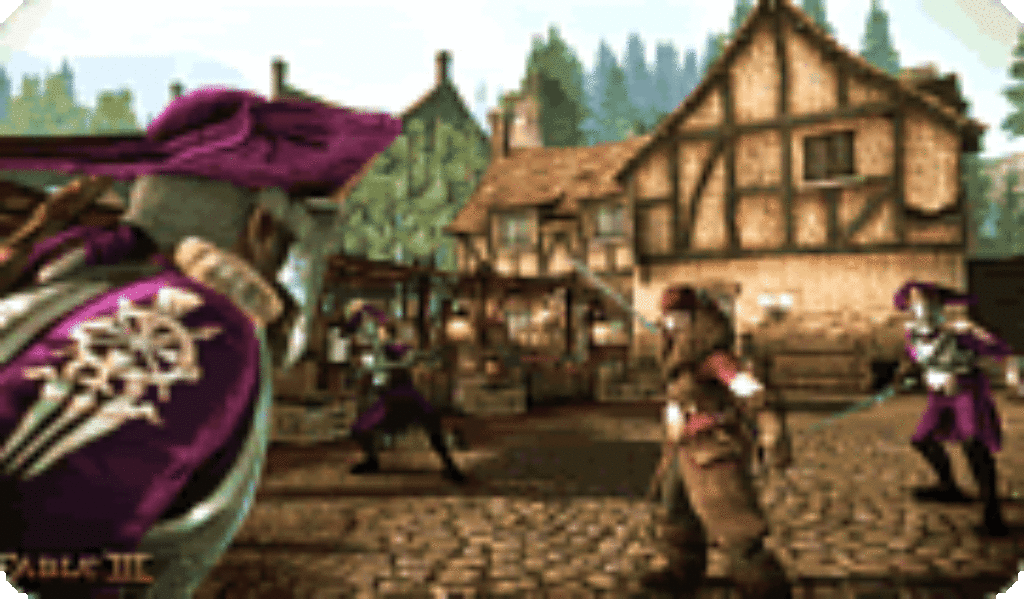
As with past Fable games, Microsoft Game Studios’ Fable III invites you to step into a colorful and captivating fairy tale world. There you shape your character’s story through a bevy of this-or-that choices and moral decisions.
This version of the good-guy-or-bad-guy adventure, however, has a few new twists up its storytelling sleeves.
Choosing a Revolution
You don’t start out as a kid who grows up into his devil-horned or shiny-haloed future self, for one thing. The action gets started some 50 years after the last game’s conclusion and you wake up as a full-grown prince or princess in the industrial-age kingdom of Albion. Your royal guy or gal is one of two children sired by the last game’s central character—a hero who ended up becoming a beloved monarch. But at this point, heroic Pop of yestergame has passed away and your elder sibling Logan has his iron fist wrapped around the royal scepter. Beloved, this guy ain’t.
In fact, as the game opens, Logan has sentenced a group of angry peons to death with a tyrannical wave of his hand. And when your young hero objects, Logan orders you to choose between condemning the sign-waving villagers or sending your best friend to the gallows. Choice No. 1 in a game full of them.
That painful beginning makes one decision obvious: Brother Logan must be removed from power. And so the lion’s share of the game entails traveling throughout the land, learning kingly lessons and activating allies who will join in the revolt. Of course, these potential warring pals want you to offer a few promises and prove your heroic grit—through a variety of kill-the-monster quests—before they’ll throw in their support.
If you do win over the various factions and eventually take the kingdom, then there’s a whole new set of choice-making that will shape the king or queen your hero will be. Do you follow through on your promises and perhaps endanger the kingdom, or squeeze the people “for their own good?” Turning a building into an orphanage will help the underprivileged, for instance. But converting it into a brothel will bring in big tax dollars to help build a necessary army. You have to choose.
The results of your choices often mirror real life—if, of course, your real life is that of an aspiring king in a fantastical land. But as I noted in my review of Fable II, ” Those choices can also make for problematic play. Along with noble decisions, the game’s designers” make sure that there’s ” lots of leeway when it comes to moral indiscretions. Lying, crude language (“h‑‑‑,” “d‑‑n,” “b‑‑tard,” “a‑‑”) and heavy drinking are a few of the lesser infractions. Down a rung from them, you can pull out a sword or crossbow to shoot and dismember the grisly creatures of the forest—and blow the heads off all the townspeople you encounter.” All that’s still true here. Plus, just because you can choose between “good” and “bad” things in this game doesn’t mean its makers have the same idea about right and wrong as you do.
Choosing Whether or Not to Play
If you’ve never heard of the Fable games before, they’re something of an action role-playing/first-person shooter hybrid. The cinematic heartbeat of things features a fairly linear march to the throne story. But there’s an open world full of one-off quests and activities to explore as well. At any point you can go off on your own and buy property, become a landlord or a businesswoman—or get married and raise a large family. Simultaneously, in the foe-battering quests, you can leap into battle with both ranged (rifles and pistols) and melee weapons (swords and mallets). Three or four selectable spells let you command fireballs, magical swords and the like.
And while we’re on that spell-weaving subject, it should be noted that quite a few of the quests involve some kind of magic or dark spirituality—never mind the colorfully animated environs and joke-laden dialogue. One quest sends your hero out to battle fire-breathing demonic chickens, and in another he digs up a book of the dead that’s used to conjure a haunted kegger for a batch of buried boozers.
That’s not to suggest that it’s all ghostly giggles in the land of Albion. There are plenty of ghoulish entities afoot that are far more severe than that. One foul whispering creature called the Crawler is said to be “darkness incarnate.” It tortures and takes possession of a central character in the story.
When characters are shot, zapped, mashed or cleaved, blood spatters the scene in a red or green spray. As you upgrade your hero’s abilities, he or she learns deadlier finishing moves. Example: a kick-your-foe-to-the-ground-and-jam-your-sword-down-his-throat move that’s wincingly effective.
You can drink till you vomit … and then bed a prostitute. (For the latter, the screen goes dark while giggles and sexual groans are heard.) Further, a little minigame work “allows” you to couple with just about anyone. One quest has you seducing another man’s wife so that he can divorce her and maintain his fortune. And when you’re done with the seduction you can betray the woman and marry the rich guy.
And that’s the lion’s carcass this game’s honey sits in. Despite the fact that Fable III sports a digital wonderworld brimming with fun characters and lots of quirky humor—all things that would appeal to the kid crowd—this is not a kids’ game. (Neither is it, really, a discerning adult’s game.) It may look like a make-believe cartoon with a revolutionary motif and kingly underpinnings, but its M-rated goo gets all over everything.

After spending more than two decades touring, directing, writing and producing for Christian theater and radio (most recently for Adventures in Odyssey, which he still contributes to), Bob joined the Plugged In staff to help us focus more heavily on video games. He is also one of our primary movie reviewers.